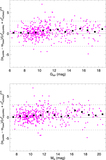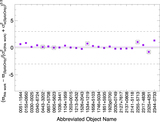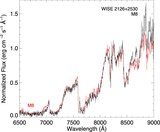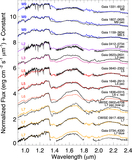Image Details
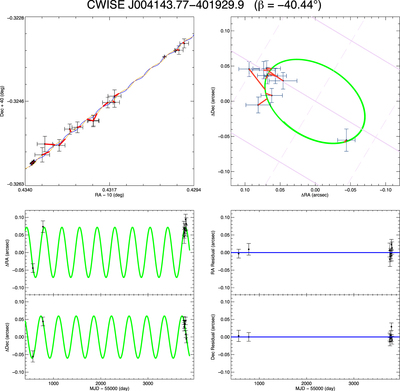
Caption: Figure 2.
Example of a target whose astrometric fit uses both Spitzer and unWISE data. (Upper left) A square patch of sky showing the measured astrometry and its uncertainty at each epoch (black points with error bars) plotted in R.A. vs. decl. Points with small error bars are the Spitzer ch2 measurements; those with larger error bars are the WISE W1 and W2 measurements. Blue curve shows the best fit from the vantage point of Spitzer. Orange curve shows this same fit as seen from the vantage point of WISE. Red lines connect each observation to its corresponding time point along the best-fit curve. (Upper right) A square patch of sky centered at the mean equatorial position of the target. Green curve is the parallactic fit, which is just the blue curve in the previous panel with the proper motion vector removed. For clarity, only the Spitzer astrometric points are shown, again with red lines connecting the time of the observation with its prediction. In the background is the ecliptic coordinate grid, with lines of constant β shown in solid pale purple and lines of constant λ shown in dashed pale purple. Grid lines are shown at 0.″1 spacing. (Lower left) The change in R.A. and decl. as a function of time with the proper motion component removed. The parallactic fit is again shown in green, and only the Spitzer astrometry is shown. (Lower right) The R.A. and decl. residuals from the fit as a function of time. As with the lower left panel, only the Spitzer data are shown.
Copyright and Terms & Conditions
© 2021. The American Astronomical Society. All rights reserved.






